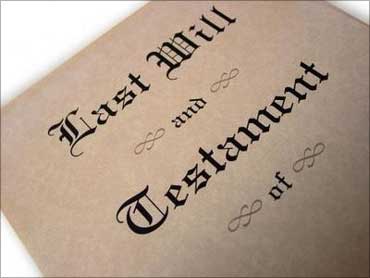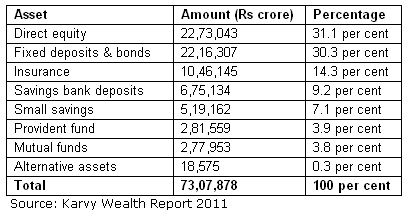 | « Back to article | Print this article |
Young and rich? Get a Will right away
The growth of financial planning has led to several aspects of personal finance being considered important by individuals which were not given such importance hitherto. One such aspect is estate planning. Just the way it is important to create wealth, it is equally important to secure its transition to your loved ones without any legal hassles after you are gone.
Need for estate planning
Death in the absence of a well-executed succession document may bring untold agony to the dependents. They may suddenly feel deprived of regular flow of income and access to financial assets. Add to that the pressure of coping with legal procedures. While insurance financially provides for survival of the dependents in case of an eventuality, estate planning ensures the already created wealth finding a clear title to the dependents. Thus it becomes an effective tool to ensure mental peace during the lifetime of an individual.
It may be noted that the issue of lack of awareness or procrastination about estate planning is a concern across the globe including developed countries. According to a survey in the US regarding wills and estate planning, it was found that only 44 per cent of the people surveyed have any document related to estate planning. In India where the level of literacy and financial literacy is a concern, financial planners have an important role to play in educating the clients about the need for estate planning.
The writer is working with financial planning Standards Board India (FPSB India) in the capacity of Vice Chairman and Chief Executive Officer. The views expressed here are personal, and do not necessarily represent that of the organization. FPSB India is the sole marks licensing authority for the CFP marks in India, through agreement with US-based FPSB Ltd.
Young and rich? Get a Will right away
With our economy growing at a faster pace over the last decade and availability of more opportunities for wealth creation, it is expected that the amount of wealth with people and the number of wealthy individuals, both are going to rise. This rise in the level of individual wealth leads to the need for estate planning.
The table alongside gives the distribution of wealth amongst different asset classes as on March 31, 2010.
In addition to the categories listed in the table, there is a sizeable amount dedicated to real estate and precious metals, gold jewellery which needs to be accounted for transfer to legal heirs. Thus it can be clearly seen that there is a huge amount of individual wealth which needs to be provided for the distribution through estate planning in our country.
Table: Asset wise break up of individual wealth in India
Young and rich? Get a Will right away
Tools of estate planning
To put simply, estate planning is the legal arrangement for the transfer and distribution of one's wealth in anticipation of death and the process by which the arrangement is completed. Estate planning involves the bequeathing arrangement through either a will or trust.
Will
A will or testament is a legal declaration by which a person, the testator, names one or more persons to manage his estate and provides for the transfer of his property at death.
A will may be legally prepared without an attorney. A will can be drafted, even by hand if it is witnessed or a pre-printed format is used in case of simple estates. The will so drafted is legally effective if the person is 18 years or older, is mentally sound, and executes it properly. The maker should understand such things as what property he or she owns, its value and to whom he or she is leaving it.
Proper execution involves the step that the maker signs, dates and acknowledges the will in the presence of two legally competent adult witnesses one of whom may be a notary public and is not a beneficiary of the will.
Will is a part of an estate plan, other important parts being power of attorney (POA) which authorises other persons to act on one's behalf. There are two types of power of attorneys:
a. Financial power of attorney: It decides who will manage the money
b. Medical power of attorney: It decides who will take health care decisions, if one is not able to take them himself/herself.
Young and rich? Get a Will right away
Trust
A trust is used in place of will to transfer the ownership of financial assets where direct or immediate transfer is not possible due to certain reasons and the purpose is to protect the interests of the beneficiaries. A trust is a legal relationship where property (real or personal, tangible or intangible) is held by one party for the benefit of another and it conventionally arises when property is transferred by one party to be held by another party for the benefit of a third party, although it is also possible for a legal owner to create a trust of property without transferring it to anyone else, simply by declaring that the property will henceforth be held for the benefit of the beneficiary.
A trust is generally created where it is believed that the beneficiary would not be able to take care of the estate for the reasons like child being minor or in the case of differently-abled children, a third party is assigned who is called the trustee and the property (Part of Whole) is transferred to the trust with the instructions which form the part of the trust deed.
Conclusion
Thus it can be clearly seen that estate planning is an integral part of the financial planning process which carves a security cover around the wealth and assets already created for entitling them to dependents without any legal hassles. Though the process is challenging both emotionally and technically, taking the services of a certified financial planner or CFP professional is preferable who can guide one through the process getting the right inputs as and when required.



